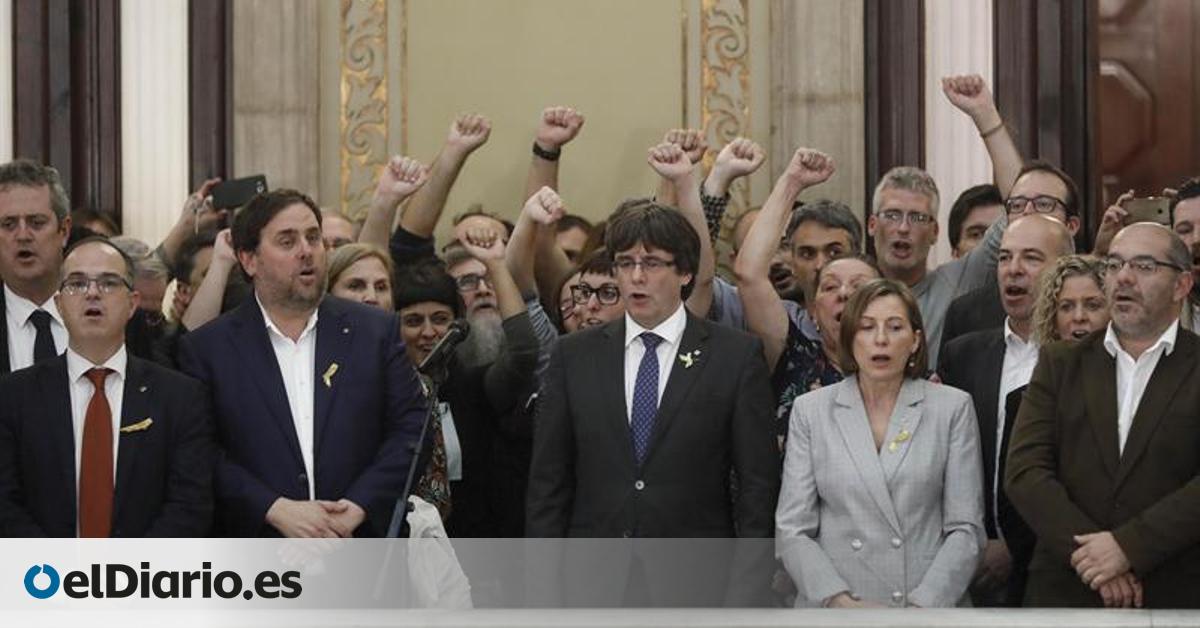
Endorsement of the Advocate General of the Court of Justice of the European Union (CJEU) for the core aspects of the amnesty law. The Advocate General has concluded that the rule “does not oppose” European regulations on the fight against terrorism or the protection of the financial interests of the Union. These are the two central elements, related to embezzlement and terrorism, that were questioned by the Spanish courts contrary to the norm. The CJEU will issue a ruling on the case in the coming months.
Beyond legal considerations, the text of the lawyer general of the CJEU forcefully replicates the political criticisms of the norm launched by the lawyer of the European Commission (who aligned himself with the positions of the PP). The attorney general denies that the law is a “self-amnesty”, endorses its entire process and frames it in the objective “of institutional normalization and reconciliation”, as defended by the Government.
The lawyer from the Court of Justice of the European Union only questions two minor and, in part, already outdated aspects of the rule, such as the obligation for judges to resolve its application in two months (the rule was published in the BOE last year and this deadline has already been met) and withdraw all precautionary measures.
In addition to the Supreme Court’s offensive against the law by refusing to apply the amnesty to Carles Puigdemont, Oriol Junqueras and the rest of the former ministers, four national instances sent preliminary rulings to the CJEU before deciding on the rule.
The most relevant preliminary questions were those sent to Luxembourg by the Court of Auditors and the National Court in the cases on the 1-O expenses and the CDR accused of terrorism. These courts consider that the rule puts the financial interests of the EU at risk and violates the European directive on the fight against terrorism, a point that this Thursday the lawyer general of the CJEU Dean Spielmann strongly denied in his conclusions.
After clearly clearing up the legal doubts about the rule, the lawyer general also responds to the unusual political criticisms against the rule made by the European Commission lawyer, Carlos Urraca, at the hearing last July. The Commission’s lawyer questioned the amnesty “in exchange” for the investiture and went so far as to call it “self-amnesty.”
The attorney general’s response is clear. “Nothing allows us to classify the law as self-amnesty,” Spielmann ditches in his text. The attorney general adds that the norm was approved in Congress as a result of a “regular” procedure and “processed within a pluralistic democratic system,” and not as a result “of a unilateral act imposed by an authoritarian power.”
The attorney general also denies that the amnesty means taking over the functions of the Judiciary. “Its application does not escape judicial control,” highlights Spielmann’s text, which emphasizes that the norm is well limited in terms of facts and time frame: “It applies to a specific set of acts, limited in time and linked to a period of political tension, without consideration of the public or private status of the interested parties.”
The rule, the attorney general insists in a long argument, “is not intended to protect a political regime or its representatives against possible judicial actions.” On the contrary, it is “a response to an exceptional situation with a declared objective of institutional normalization and reconciliation.”
In short, in the absence of the CJEU ruling, the Advocate General aligns himself with the Government’s theses, which were defended by the Public Prosecutor’s Office and the State Attorney’s Office at the Luxembourg hearing, and makes an in-depth reply to the political criticisms of the rule made by the European Commission and several Spanish courts.
Political reactions
Despite not being the verdict in the case, political reactions occurred this Thursday. The president of the Generalitat, Salvador Illa, has positively valued the decision and has asked that a law that he considers is good for Catalonia and Spain be applied “swiftly and without subterfuge”: “We always trust that it would be like this.” For his part, the Minister of the Presidency, Justice and Relations with the Courts, Félix Bolaños, has called the resolution of the attorney general of the CJEU a “resounding victory.”
For its part, the independence movement has trusted that the future resolution of the CJEU will follow in the footsteps of the opinion of the advocate general. Former president Carles Puigdemont has assessed that the ruling “reveals the indecent strategy of delay and manipulation to block the application of the amnesty law”, and the president of ERC, Oriol Junqueras, has celebrated that the lawyer “endorses the theses that ERC has always defended”, while criticizing the “manifest” intention of the Supreme Court not to apply the rule.
On the other hand, the PP has clung to Spielmann’s minor questions about the rule. Ignoring that the lawyer endorses the bulk of the rule, the leader of the PP in the European Parliament, Dolors Montserrat, has attacked the law again.
Waiting for sentence
The EU Advocate General is a figure in the CJEU who provides judges with legal opinions on cases after studying them in depth. The conclusions of the advocate general are not binding, but they guide the Court of Justice of the European Union (CJEU) in drafting the ruling, which has not yet been dated.
At a legal level, the Commission He stood somewhere between supporters and detractors. of the law: he endorsed it in broad strokes but rejected some of its aspects and, in others, asked to leave them in the hands of the Spanish judges (an extreme that the independentistas want to avoid). The conclusions of the attorney general are in line with pro-independence expectations and do not give room for maneuver to the Spanish courts that have raised the preliminary questions to not apply the law.
The European response to the amnesty depends, to a large extent, on making any new request from the Supreme Court to extradite former president Carles Puigdemont almost impossible, as well as saving the CDR accused of terrorism from jail.
One of the key aspects of the future ruling will be to see the room for maneuver that the Luxembourg judges can leave to the Spanish courts to apply the amnesty (and that will be key to verify if the magistrates in Spain once again ignore the law and do not apply it in the most sensitive cases for the independentists, as the Supreme Court has done with Puigdemont). For this we will have to wait for the CJEU ruling in a few months.
Source: www.eldiario.es

